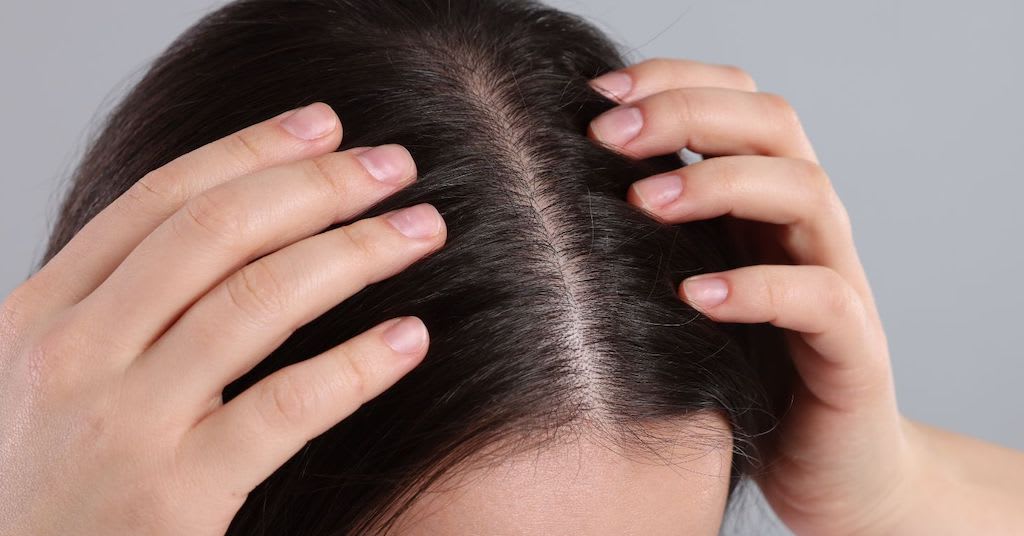If you have diabetes, you may find yourself asking: does diabetes cause hair loss? Unfortunately, the answer is yes, it can.
Diabetes hair loss can happen through a few different mechanisms. The good news is that by understanding the connection between diabetes and hair thinning, you can take steps to reduce shedding and promote healthy hair growth.
In this article, we'll explore the relationship between diabetes and hair loss. We’ll also provide tips to prevent and treat diabetes hair loss.
Why Does Diabetes Cause Hair Loss?

The connection between diabetes and hair loss lies in how the condition affects the body. When blood sugar is consistently high, it damages blood vessels and nerves over time. This leads to poor circulation, restricting blood flow and preventing essential nutrients and oxygen from reaching the hair follicles. Without proper nourishment, the follicles cannot effectively produce new strands of hair to replace old ones that have fallen out and died. 1 As a result, those with diabetes may experience:
- Hair thinning
- Hair loss
- Decreased hair growth 1
Stress is another factor in diabetes hair loss. Living with a chronic condition like diabetes can take a mental and physical toll, and stress itself is a known contributor to hair loss. Together, these elements create a challenging environment for maintaining healthy hair. 1
How Diabetes Affects Hair Growth
Hair grows in cycles that include growth, rest, and shedding phases. Diabetes can interfere with these natural processes in several ways, leading to hair thinning or loss. Here’s how:
- Poor circulation: High blood sugar levels can damage blood vessels, reducing blood flow throughout the body, including the scalp. Since hair follicles depend on a steady blood supply to stay healthy and active, reduced circulation can weaken follicles and result in hair loss. This connection explains part of the answer to "Does diabetes cause hair loss?" 1
- Hormonal imbalances: Since insulin is a hormone, imbalances in insulin affect other hormones too. For instance, thyroid disorders are incredibly common in people with diabetes, affecting up to 95% of those with type 2 diabetes. When thyroid hormones are off, this can throw off the natural hair growth cycle and spur hair loss. 2
- Autoimmune conditions: People with diabetes, especially type 1 diabetes, have an increased risk of autoimmune diseases like alopecia areata. This condition causes the immune system to attack hair follicles, resulting in patchy hair loss. 1
If you’re concerned about diabetes hair loss, it’s a good idea to talk to your doctor about hair loss treatments, including medications like minoxidil. These can help support regrowth, especially when combined with managing your overall health.
Can You Prevent or Treat Diabetes Hair Loss?
There are steps you can take to minimize diabetes hair loss and promote healthier hair growth. Here’s what you can do:
- Keep blood sugar levels in check: Maintaining stable blood sugar levels is crucial for overall health and can help reduce the risk of diabetes hair loss. High blood sugar worsens poor circulation, which harms hair follicles. Regularly monitor your blood sugar and work with your healthcare provider to stay on track. 1
- Eat a balanced diet: Your hair relies on nutrients to grow and stay strong. A diet rich in vitamins, minerals, and protein can support hair health. Include foods like leafy greens, lean proteins, whole grains, and healthy fats in your meals. Nutrients such as biotin, zinc, and iron are particularly beneficial for hair growth. 3
- Improve circulation: Regular physical activity can improve blood flow to your scalp and the rest of your body. Simple exercises like walking, yoga, or light cardio can make a noticeable difference in circulation, which helps keep hair follicles healthy. 3
- Manage stress: Stress management is essential for both diabetes control and reducing hair loss. Chronic stress can worsen both conditions. 1 Relaxation techniques like meditation, deep breathing exercises, or engaging in hobbies can help lower stress levels, which in turn supports healthier hair growth.
- Treat underlying conditions: If conditions like alopecia areata or scalp infections are contributing to your hair loss, consult a healthcare professional for treatment. Medications such as minoxidil can encourage hair regrowth while treating infections can prevent further damage to hair follicles.
Other Factors That Can Contribute to Hair Loss
While diabetes is a significant factor in hair loss, other conditions can also play a role. These include:
- Aging: Hair naturally becomes thinner as we age.
- Thyroid issues: People with diabetes have a higher risk of thyroid issues, which can also lead to hair loss.
- Medications: Certain medications for diabetes or related health conditions may list hair loss as a side effect.
- Nutritional deficiencies: Insufficient levels of essential nutrients like iron, zinc, or biotin can weaken hair and contribute to hair loss. 3
If you suspect other factors are involved in your hair loss, a healthcare provider can help you identify and address them. These factors often intertwine with diabetes hair loss, compounding the issue.
When to Seek Help

Diabetes hair loss can feel overwhelming, but it’s important to remember that help is available. If you’re noticing significant thinning, bald spots, or slowed hair regrowth, consult a healthcare professional. They can determine whether diabetes is contributing to the issue and suggest treatments to manage or reverse the hair loss.
Seeking help early can make a difference in preventing further hair loss and encouraging regrowth.
Conclusion
Does diabetes cause hair loss? Yes, it can, but you can take steps to manage it. By controlling your blood sugar levels, eating a nutrient-rich diet, managing stress, and addressing other health concerns, you can minimize the effects of diabetes hair loss and support healthier hair growth. If you’re struggling with hair loss, don’t hesitate to consult a healthcare professional for personalized advice. Exploring resources like MailMyMeds can also help you find ways to support hair growth while managing diabetes effectively.






